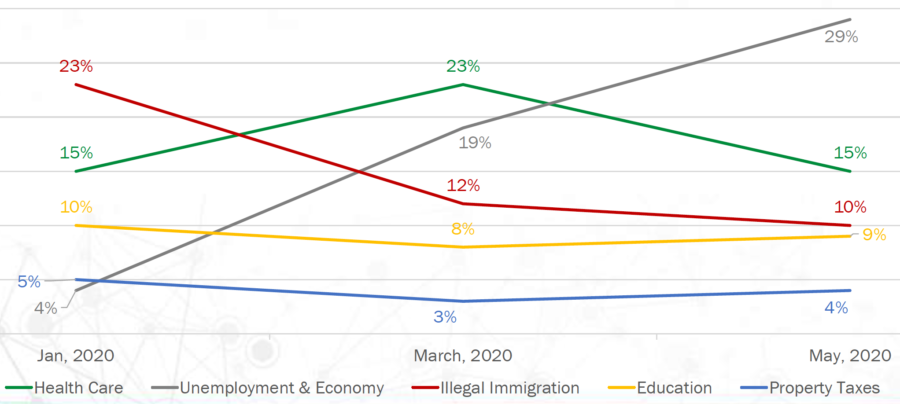AUSTIN— Nearly one in three Texans now says unemployment and the economy are the most important issue in the state today, according to a new poll conducted by WPA Intelligence for the Texas Public Policy Foundation. Twenty-nine percent of likely voters in Texas say it is their top concern, jumping up 25 points from just 4 percent in January.
It represents a major shift in public sentiment as jobs have become the top issue for the first time since TPPF began tracking public opinion, passing health care (15 percent) and illegal immigration (10 percent).

“Texans’ perception of the crisis has evolved to the point that their economic security is now twice as important as any other issue,” said TPPF’s Chief Communication Officer Brian Phillips. “As we have become more comfortable with the way our health care sector is combating the disease, the focus is now on getting our lives and livelihoods back and avoiding further economic hardship.”
Two Texases
The survey paints a picture of “Two Texases,” with one group largely unaffected financially but a significant minority facing potential ruin due to the government response to the virus.
- Fifty-nine percent say their financial situation is about the same as three months ago. Thirty-one percent say it has gotten worse.
- By a similar margin, most Texans said that financially they could stay at home as long as necessary (59 percent), but 35 percent said they would either have trouble soon, are facing financial ruin, or are already in a dire financial situation due to the economic shutdown.
- Half of Texans are still working outside the home and 12 percent are working from home. But one in four Texans are either working reduced hours or have been furloughed or laid off because of the virus, including 30 percent of African Americans.
- Fortunately, 81 percent report they still have health insurance, but 10 percent say they lost coverage as a result of the outbreak and lockdown.
When asked how long it would take them to recover, 59 percent said they have not suffered financially, but a startling 22 percent say it will take a year or more, which includes 28 percent of Hispanics. Fourteen percent said it would take weeks or months to get back on their feet.
Reactions to the Shutdown
Texans have varied reactions to the shutdown and other government guidelines and mandates. Fully 91 percent believe Texans have a responsibility to take concrete actions to protect others, but they are split on whether wearing masks should be mandatory. Forty-nine percent say wearing them should be required and 48 percent say it should be a personal choice. A healthy majority of Texans (79 percent) agree that we should continue practicing social distancing until a vaccine and treatment can be developed, while just 17 percent disagree.
Nearly half (47 percent) say the economic impact of the government’s response to coronavirus is too great, and that we need to accept some risk of new infections in order to make sure people can work and earn a living, while 37 percent believe the health concerns surrounding the coronavirus should outweigh concerns about the economic impact of the government’s response.
People’s current economic situation appears to influence whether they feel the economic impact has been too great or that health concerns should be paramount. People still working outside the home think the economic impact has been too great by a margin of 14 points (49 to 35 percent). For those who have been required to work from home, the margin is 8 points (43 to 35 percent) in favor of economic impact. Texans working reduced hours choose the economic impact by just 5 points (46 to 41 percent).
However, those who have been laid off, and therefore eligible for unemployment benefits, say the health concern should outweigh the economic impact by a margin of 2 points (44 to 42 percent).
Several lawmakers have pointed out that the CARES Act, passed in March, creates incentives for people to stay unemployed by adding an additional $600 per month to unemployment benefits. As the Wall Street Journal reported, a University of Chicago study found that “68 percent of laid-off workers are now making more unemployed, and the average (median) replacement rate is 134 percent. One in five unemployed workers will make twice as much not working while the bottom 10 percent—generally part-timers—will collect three times more.”
While the number of Texans who say the coronavirus will have a serious impact on their life is still high (73 percent), it has dropped 18 points since March. Seven in 10 Texans are afraid that their favorite local neighborhood restaurant or shop might go out of business. A quarter of the state is not.
Regarding returning to the work under the required guidelines, 77 percent say it is safe and 18 percent say it is unsafe. However, just 64 percent said they are personally willing to return, with 29 percent saying they would not.
The poll sampled 800 likely voters in Texas from March 24-28 and has a margin of error of +/-3.5 percent.